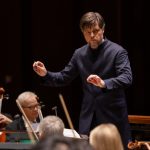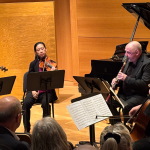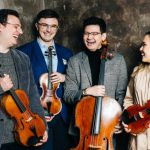William Ford | 4 AUG 2025
As she prepares to launch a 15-city U.S. tour this month, internationally acclaimed guitarist Xuefei Yang continues to expand the boundaries of classical guitar with a program that spans continents and cultures. The tour coincides with the release of Chapeau Satie, her latest album on the Platoon label, which features original guitar arrangements of works by Erik Satie in honor of the composer’s centenary. Born in Beijing and now based near London, Yang is known for her trailblazing role as the first internationally recognized Chinese classical guitarist. In a recent interview with EarRelevant’s William Ford, Yang reflected on her artistic journey, the cross-cultural threads woven through her music, and how she approaches interpretation both in recordings and on stage.
William Ford: It’s great to meet you, Xuefei. Are you still living near London?
Xuefei Yang: Yes, just outside of London. I’ve been based in the UK for over 20 years now. I originally came here to study at the Royal Academy of Music in London, and after graduating, I stayed. I’ve lived in this particular home for five years.
Ford: I’ve been listening to your recordings on YouTube all morning. They’re delightful—especially the videos where you accompany yourself. Who does the production?
Yang: Thank you! My partner and I produce them ourselves. I have a clear vision of what I want musically and visually. For instance, in the Satie video, I dressed in his signature velvet jacket and hat. The second version of me wore a long dress to contrast the mood. We shot it by the River Thames, near where I live. I want the visuals to reflect and support the music.
Ford: That attention to detail really shows. Where were you born?
Yang: I was born in Beijing. My start with the guitar was a pure coincidence. When I was seven, my parents—both teachers—wanted me to learn an instrument to help calm me down and focus on school. They initially thought about the accordion, which was popular in China at the time. But the music teacher at my school was organizing a guitar group and told my mom that the accordion was too heavy and loud for a small girl. So, I joined the guitar group without even knowing what a guitar was. When I opened the case and plucked the strings, I immediately loved the sound.
Ford: That’s quite a story! Was your household full of traditional Chinese music?
Yang: Yes, definitely. My father played a traditional wind instrument called the suona and led an amateur Chinese band. My mother was always listening to music. So, yes, I grew up with a lot of traditional Chinese music around me.
Ford: When you started playing guitar, were you playing Chinese music or Western music?
Yang: Mainly Western music—classical pieces and even some American songs. As a child, I didn’t think in terms of genres. Music was just music. I didn’t experience any cultural barrier. I just enjoyed playing.
Ford: That’s interesting because Chinese traditional music often includes microtones—notes between the standard Western pitches. Did you find it difficult to adjust to the Western 12-tone scale?
Yang: Actually, no. In fact, I found Western music to be more dimensional—richer harmonically and more contrapuntal. Chinese music is more horizontal, more poetic. It emphasizes spirit and imagination over technical precision. For example, ancient Chinese music can sound very sparse, but that openness gives room for expression and color. They’re just very different approaches.
Ford: That makes sense. Chinese music traditionally doesn’t rely on harmony in the Western sense.
Yang: Exactly. Traditional Chinese instruments don’t typically play chords. But they can produce incredible nuance from a single note. The guitar, in contrast, resonates well and allows for harmony, but can’t quite imitate the tonal flexibility of instruments like the pipa.
Ford: Speaking of the pipa, you arranged the piece “Three Variations on Plum Blossom” for guitar. How does your version compare to a performance on pipa?
Yang: The pipa has a very crisp and bright sound, using fake nails and metal strings nowadays. Its tone cuts through but doesn’t resonate like the guitar, which has a warmer, more harmonic sound. The pipa can’t play chords, but it can express a single note in many different ways—bending, sliding, pulling. The guitar can’t replicate that exactly, but it brings resonance and intimacy.
Ford: When you decide to arrange a piece for guitar, how do you choose the repertoire?
Yang: First, I have to love the music. But not everything works on guitar. For example, I wouldn’t try to adapt a Beethoven piano sonata or a large symphonic work. They’re just not suited to the instrument. But Satie’s music works beautifully—it’s minimalist, lyrical, and intimate.
Ford: What drew you to Satie’s music?
Yang: Like most people, I first heard the Gymnopédies and Gnossiennes. They’re mysterious and haunting, and they give the performer so much freedom. He didn’t use traditional markings—no tempo or bar lines, just poetic phrases like “tip of the tongue.”
Ford: That seems like it would resonate with your Chinese musical background.
Yang: Absolutely. Traditional Chinese art values evocation over precision. Satie’s open-ended scores invite interpretation, much like ancient Chinese music.
Ford: In preparing your Chapeau Satie album, did you discover new aspects of his personality?
Yang: Yes. He wasn’t just avant-garde; he was also part of the popular cabaret scene in Montmartre. He worked with top artists of his time and wrote songs for famous singers. I wanted to reflect that in the album—so I included both his art music and cabaret songs like “La Diva de l’Empire” and “Je te veux.”
Ford: Have you ever considered recording the Ogives?
Yang: I’d need to look at the scores first to see if they’d work on guitar. They’re striking pieces, but not everything translates well.
Ford: If you recorded the Satie pieces again, would you interpret them differently?
Yang: Probably, yes. Every performance is different. In the studio, I focus on nuance for the microphone. In a live setting, the acoustics affect my pacing and dynamics. I might play slower in a resonant venue or adjust articulation in a dry room. Even my mood can affect the interpretation.
Ford: Do you listen to your own recordings?
Yang: Rarely! I always think, “Oh, I could have played that differently.” But now I try to think of recordings like photographs—just a snapshot of one moment.
Ford: You’re about to embark on a U.S. tour. How do you travel between cities?
Yang: I don’t drive, so I’ll be flying or taking the train. I’ll be traveling mostly on my own.
Ford: Do you rely on your own sense of the sound in a venue, or do you get outside feedback?
Yang: Both, ideally. If I have someone I trust, I’ll ask their opinion. Otherwise, I rely on my experience and sometimes consult the sound engineer. Ultimately, I need to feel comfortable to perform well.
Ford: Do you ever feel like a performance just didn’t land?
Yang: Of course. But I have a basic standard, so even on an off night, I won’t fall below that. Most people won’t notice unless they know me really well.
Ford: I think most audiences come wanting to enjoy the music.
Yang: That’s what I hope. But yes, occasionally someone might come just to judge. That’s life.
Ford: Tell me about your tour program.
Yang: It’s very diverse—music from China, Japan, France, Spain, Argentina, Brazil, Mexico, and of course, America. I want to take the audience on an emotional journey around the world. Especially in these divided times, I hope music can bring people closer together.
Ford: That’s a beautiful goal. Thank you, Xuefei. It was an absolute pleasure to speak with you.
Yang: Thank you, William. I really enjoyed our conversation. ■
Xuefei Yang: U.S. Tour Dates and Venues
Presented by Concerts in America
- Aug 13, 7:30pm – Houston, TX
Bayou Theater, University of Houston - Aug 15, 7:30pm – Boston, MA
Arlington Street Church - Aug 16, 7:30pm – New York, NY
New York Society for Ethical Culture - Aug 19, 7:30pm – Philadelphia, PA
Old Pine Street Presbyterian Church - Aug 20, 7:30pm – Baltimore, MD
Earl and Darielle Linehan Concert Hall - Aug 21, 7:30pm – Bethesda, MD
Westmoreland Congregational United Church of Christ - Aug 22, 7:00pm – Norfolk, VA
The Salvation Army Kroc Center Hampton Roads - Aug 23, 7:30pm – Charlotte, NC
Central Piedmont Parr Center - Aug 25, 7:30pm – Atlanta, GA
Central Presbyterian Church - Aug 27, 7:30pm – Memphis, TN
Scheidt Family Performing Arts Center - Aug 29, 7:30pm – Seattle, WA
Town Hall Seattle - Aug 30, 7:30pm – Portland, OR
First Congregational United Church of Christ - Sep 1, 7:30pm – San Francisco, CA
St. Mark’s Lutheran Church - Sep 3, 7:30pm – Long Beach, CA
First Congregational Church of Long Beach - Sep 6, 7:30pm – Dallas, TX
Unity of Dallas
EXTERNAL LINKS:
- Xuefei Yang: xuefeiyang.com

Read more by William Ford.








.png)